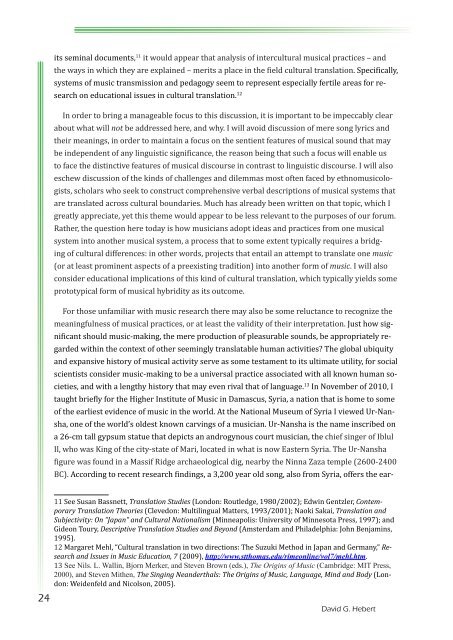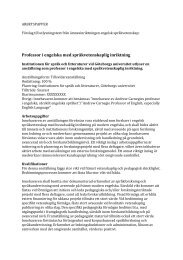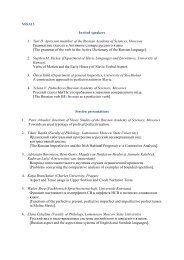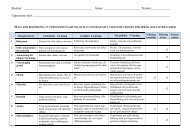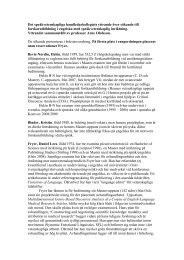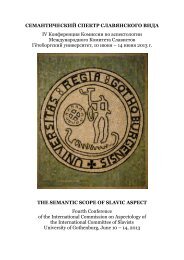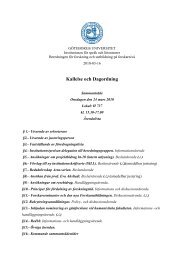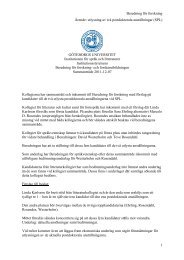planted, adopted and fused with indigenous traditions, the notion of cultural translation maymost accurately fit the specific objective of intentionally representing significant aspects of onemusical tradition through the techniques of another distinct tradition. Artistic choices to (ornot to) explicitly aim for this mode of cultural translation are routinely made by contemporarymusicians active in hybrid genres, and analysis of specific examples from such ensembles as theYoshida Brothers, Helsinki Koto Ensemble, Tokyo Brass Style, and Moscow Pan-Asian Ensemblewill illustrate how cultural translation can be either conscious or unconscious, and deliberatelyhighlighted or shunted in such music projects. A theoretical model will be proposed as one wayof conceptualizing various approaches to cultural translation in music.RATIONALE AND LIMITATIONS: MUSICAL TRANSLATION<strong>Cultural</strong> translation can be rather difficult to define. By virtue of its being (1) an emerging interdisciplinaryfield, and (2) a corpus of paradigms disseminated via pedagogy within academiccontexts, it seems a vast array of activity within the field of cultural translation might itself beregarded as cultural translation, for whenever we strive to effectively communicate complex conceptsfrom one system of thought from another – whether to colleagues in other disciplines orto students of any age or educational background – it appears we are to some extent engaging incultural translation. Still, for the purposes of this essay I will regard cultural translation to constituteonly a very slight broadening of the notion of “translation” as traditionally used in referenceto languages.For several generations, musicologists have written about similarities between music andlanguage, and reflected on ways that analytical approaches from the field of linguistics may beeffectively applied to music. Linguists and literary critics, however, have generally taken less ofan interest in musicological paradigms. Unsurprisingly, a similar trend may be seen in the emergingfield of cultural translation, for which it already appears that linguistic and literary discussionmay be dominant relative to paradigms associated with research on other forms of culturaldiscourse (such as music, theatre, dance, visual art, fashion, etc.). What of consequence to interculturalunderstanding might inevitably be missed by theorization that arises almost exclusivelyfrom examination of a single form of discourse as a basis for cultural analysis? Translators routinelygrapple with complex meanings embedded in nonlinguistic forms of communication thatdefy conventional modes of translation, and consequently a holistic and trans-disciplinary theoreticalorientation is seemingly desirable to many proponents of cultural translation. Sherry Simonhas acknowledged “the concerns of those who fear that an uncontrolled enlargement of theidea of translation will be a threat to the new discipline of translation studies.” 10 In recognitionthat this concern may have some legitimacy, the rationale for this essay arises from a recognitionthat even a field striving to maintain its focus on language may still have something valuable tolearn from the other form of symbolically-rich human discourse regarded to most closely resemblelanguage: music. Moreover, my approach will make deliberate use of a generously conservativedefinition for what “translation” might entail in musical contexts. Despite such reservationsand qualifications, one must acknowledge that according to the positions advanced in many of10 Sherry Simon, “Response,” Translation Studies, 2(2), 208-213 (2009), p.210.<strong>Cultural</strong> translation and Music23
its seminal documents, 11 it would appear that analysis of intercultural musical practices – andthe ways in which they are explained – merits a place in the field cultural translation. Specifically,systems of music transmission and pedagogy seem to represent especially fertile areas for researchon educational issues in cultural translation. 12In order to bring a manageable focus to this discussion, it is important to be impeccably clearabout what will not be addressed here, and why. I will avoid discussion of mere song lyrics andtheir meanings, in order to maintain a focus on the sentient features of musical sound that maybe independent of any linguistic significance, the reason being that such a focus will enable usto face the distinctive features of musical discourse in contrast to linguistic discourse. I will alsoeschew discussion of the kinds of challenges and dilemmas most often faced by ethnomusicologists,scholars who seek to construct comprehensive verbal descriptions of musical systems thatare translated across cultural boundaries. Much has already been written on that topic, which Igreatly appreciate, yet this theme would appear to be less relevant to the purposes of our forum.Rather, the question here today is how musicians adopt ideas and practices from one musicalsystem into another musical system, a process that to some extent typically requires a bridgingof cultural differences: in other words, projects that entail an attempt to translate one music(or at least prominent aspects of a preexisting tradition) into another form of music. I will alsoconsider educational implications of this kind of cultural translation, which typically yields someprototypical form of musical hybridity as its outcome.For those unfamiliar with music research there may also be some reluctance to recognize themeaningfulness of musical practices, or at least the validity of their interpretation. Just how significantshould music-making, the mere production of pleasurable sounds, be appropriately regardedwithin the context of other seemingly translatable human activities? The global ubiquityand expansive history of musical activity serve as some testament to its ultimate utility, for socialscientists consider music-making to be a universal practice associated with all known human societies,and with a lengthy history that may even rival that of language. 13 In November of 2010, Itaught briefly for the Higher Institute of Music in Damascus, Syria, a nation that is home to someof the earliest evidence of music in the world. At the National Museum of Syria I viewed Ur-Nansha,one of the world’s oldest known carvings of a musician. Ur-Nansha is the name inscribed ona 26-cm tall gypsum statue that depicts an androgynous court musician, the chief singer of IblulIl, who was King of the city-state of Mari, located in what is now Eastern Syria. The Ur-Nanshafigure was found in a Massif Ridge archaeological dig, nearby the Ninna Zaza temple (2600-2400BC). According to recent research findings, a 3,200 year old song, also from Syria, offers the ear-2411 See Susan Bassnett, Translation Studies (London: Routledge, 1980/2002); Edwin Gentzler, ContemporaryTranslation Theories (Clevedon: Multilingual Matters, 1993/2001); Naoki Sakai, Translation andSubjectivity: On “Japan” and <strong>Cultural</strong> Nationalism (Minneapolis: University of Minnesota Press, 1997); andGideon Toury, Descriptive Translation Studies and Beyond (Amsterdam and Philadelphia: John Benjamins,1995).12 Margaret Mehl, “<strong>Cultural</strong> translation in two directions: The Suzuki Method in Japan and Germany,” Researchand Issues in Music Education, 7 (2009), http://www.stthomas.edu/rimeonline/vol7/mehl.htm.13 See Nils. L. Wallin, Bjorn Merker, and Steven Brown (eds.), The Origins of Music (Cambridge: MIT Press,2000), and Steven Mithen, The Singing Neanderthals: The Origins of Music, Language, Mind and Body (London:Weidenfeld and Nicolson, 2005).David G. Hebert
- Page 1: Cultural TranslationsProceedings of
- Page 4 and 5: PrefaceThe idea of organizing a wor
- Page 6 and 7: ContentsAcknowledgementIIPrefaceIII
- Page 8 and 9: Literature and Transculturality:Som
- Page 10 and 11: agenda of Herder, which was to figh
- Page 12 and 13: nomenon. However, until long into t
- Page 14 and 15: Tawada’s work appeared in Swedish
- Page 16 and 17: multiple interpretations. Japan is
- Page 18 and 19: Cultural Translation between Tradit
- Page 20 and 21: George P. Murdock illustrated the p
- Page 22 and 23: ancestor of the Maori arrived in Ao
- Page 24 and 25: nal names do not necessarily have.
- Page 26 and 27: One of the functions of ‘cultural
- Page 28 and 29: PRELUDEIn 2003, an original artisti
- Page 32 and 33: liest known written clues regarding
- Page 34 and 35: since there are many Asians and Pac
- Page 36 and 37: listening to and evaluating sounds
- Page 38 and 39: Ensemble, and the Moscow Pan-Asian
- Page 40 and 41: temporary Finnish folk music. 29I a
- Page 42 and 43: Although some space for improvisati
- Page 44 and 45: whom have devoted many years to ser
- Page 46: POSTLUDEBy way of conclusion, allow
- Page 49 and 50: IntroductionThe aim of this paper i
- Page 51 and 52: to discuss what role Japan was to p
- Page 53 and 54: I may be allowed henceforth to use
- Page 55 and 56: program was to promote and help stu
- Page 57 and 58: 50different of that of Millán -Ast
- Page 59 and 60: most impracticable people in the ea
- Page 61 and 62: intending to give the Book a quasi
- Page 63 and 64: understood by the West on a time wh
- Page 65 and 66: FUJIWARA Masahiko. (2008) Kokka no
- Page 67: - (2002) Cultural light, political
- Page 70 and 71: Translation, or better, linguistic
- Page 72 and 73: one may not expect anything other t
- Page 74 and 75: as Murakami opts for a globalized v
- Page 76 and 77: market. 17 Another indispensable to
- Page 78 and 79: (This is part of my doctoral thesis
- Page 80 and 81:
elieve advances man’s progress he
- Page 82 and 83:
ender the New Testament into Japane
- Page 84 and 85:
a synonym for kami. The latter is a
- Page 86 and 87:
The American school text is in the
- Page 88 and 89:
Willson Reader 46 T73 47I will not
- Page 90 and 91:
Gentlzer, Edwin & Tymoczko, Maria 2
- Page 92 and 93:
Tea ceremony or tea cult?Translatin
- Page 94 and 95:
Company (VOC), men came from differ
- Page 96 and 97:
H. Stolpe gathered items in Japan f
- Page 98 and 99:
simple presentations had negative i
- Page 100 and 101:
theticism, with its manifold bearin
- Page 102 and 103:
Kumakura, Isao (1980) 近 代 茶
- Page 104 and 105:
1. Introduction and aim of the pape
- Page 106 and 107:
main character and the caller doesn
- Page 108 and 109:
not” and ”at present” that ha
- Page 110 and 111:
match this name, a sea as artificia
- Page 112 and 113:
I John Gabriel BorkmanHenrik Ibsen
- Page 114 and 115:
his dream during the 1870s, when ca
- Page 116 and 117:
make a decision. But it turns out t
- Page 118 and 119:
Ôgai’s change of translation str
- Page 120 and 121:
Behind every utterance lies two mot
- Page 122 and 123:
a large group of persons be gathere
- Page 124 and 125:
The “Territory of Translation”
- Page 126 and 127:
八 十 日 間 世 界 一 周 :
- Page 128 and 129:
heuristic tools, especially conside
- Page 130 and 131:
Left: Photo of Kawashima Chūnosuke
- Page 132 and 133:
Burlington Gardens is in London (Ro
- Page 134 and 135:
門 アリ 入 リテ 見 レバ
- Page 136 and 137:
scene seems to be merely one of man
- Page 138 and 139:
Niwa Jun’ichirō’s Spring Tale
- Page 140 and 141:
The text is full of detailed descri
- Page 142 and 143:
where the narrative voice does not
- Page 144 and 145:
The reason the “territory of tran
- Page 146 and 147:
Translating the Trip Around the Wor
- Page 148 and 149:
ForwordI have been working on my do
- Page 150 and 151:
clining though. By the end of 1980
- Page 152 and 153:
幸 い 神 の 怒 りは 鎮 ま
- Page 154 and 155:
The Public Sphere as Deliberation o
- Page 156 and 157:
and absence of hierarchy would have
- Page 158 and 159:
was used much like we would use “
- Page 160 and 161:
outcasts and bandits - were suppose
- Page 162 and 163:
cal sense, the arena where particip
- Page 164 and 165:
society” and in which “there wa
- Page 166 and 167:
sic formulations, the public sphere
- Page 168 and 169:
はじめに日 本 統 治 下 の
- Page 170 and 171:
似 地 一 下 一 下 拽 那 鼻
- Page 172 and 173:
ということから、 古 丁
- Page 174 and 175:
の「 序 」で、 大 東 亜
- Page 176 and 177:
3.1 翻 訳 と 満 洲 国 語 政
- Page 178 and 179:
取 り 入 れを 主 張 する
- Page 180 and 181:
文 化 の 翻 訳 としての「
- Page 182 and 183:
史 性 にも 留 意 すべきだ
- Page 184 and 185:
て、 渦 巻 きよりほかは
- Page 186 and 187:
変 わらないということも
- Page 188 and 189:
訳 語 と 新 語 から 見 る
- Page 190 and 191:
しは「 無 為 」や「 本 性
- Page 192 and 193:
思 想 を 基 礎 として、
- Page 194 and 195:
って「 物 理 上 哲 学 」
- Page 196 and 197:
し、まさにはこの 時 期
- Page 198 and 199:
意 譯 : 理 學 、 性傅 汛
- Page 200 and 201:
柴 田 昌『 增 補 訂 正 英
- Page 202 and 203:
一 八 七 七 年 、 文 部 省
- Page 204 and 205:
日 中 友 好 の 象 徴 「 鑑
- Page 206 and 207:
と 指 摘 した。成 吉 思
- Page 208 and 209:
をあげている。さらにま
- Page 210 and 211:
に 請 ひて 出 家 を 求 む
- Page 212 and 213:
この 時 奉 請 の 十 師 等
- Page 214 and 215:
歴 史 小 説 『 天 平 の 甍
- Page 216 and 217:
点 」が 生 じたと 指 摘
- Page 218 and 219:
まず、 昨 今 、 活 発 に
- Page 220 and 221:
2、 従 来 の 比 較 文 学 (c
- Page 222 and 223:
普 遍 理 論 を 適 用 し、
- Page 224 and 225:
ス・テグネル(Esaias Tegnér,
- Page 226 and 227:
に 満 ちる「 生 命 」に
- Page 228 and 229:
う 形 をとって 展 開 した
- Page 230:
学 が 大 学 で 展 開 して


